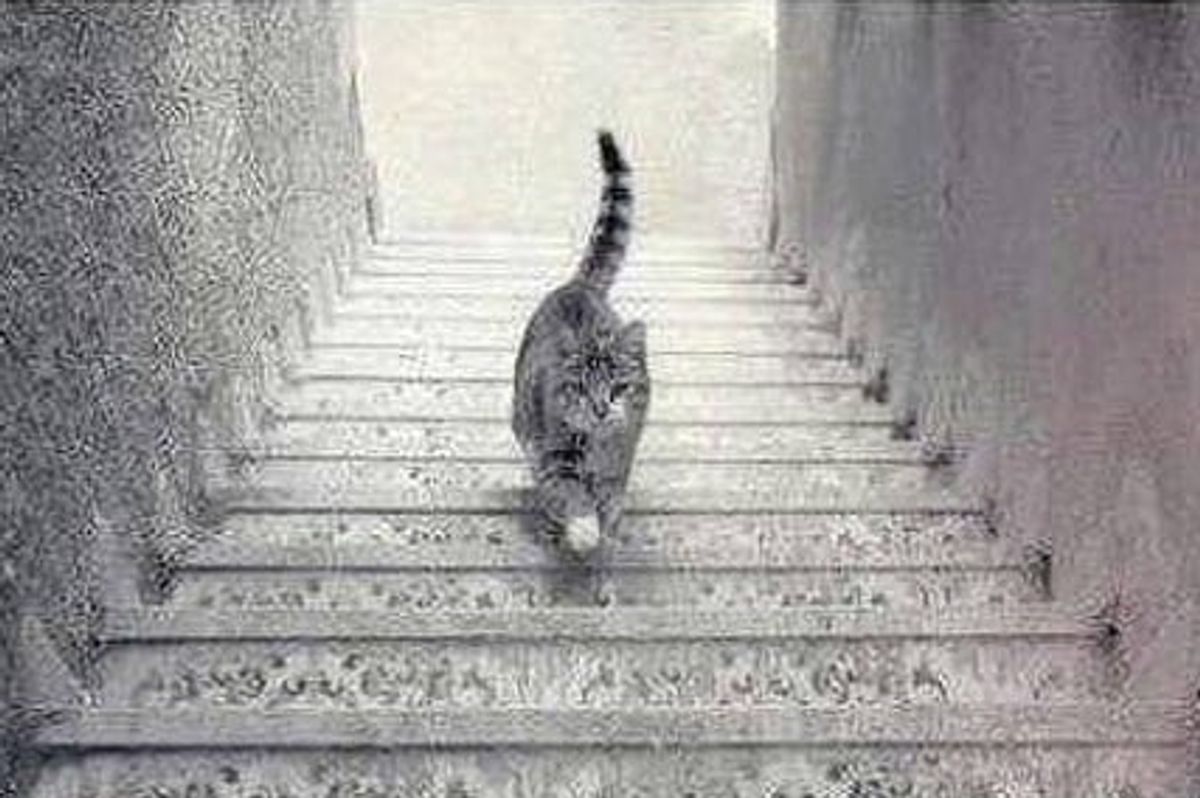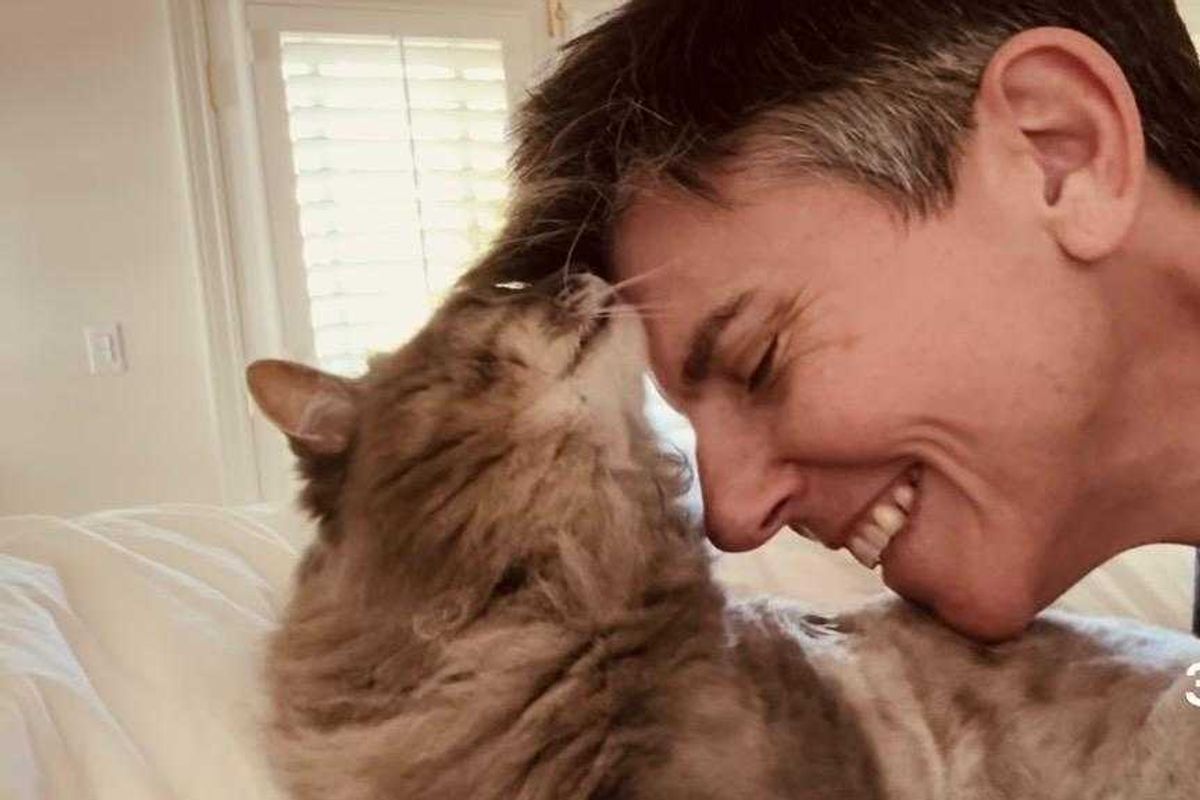First impressions: People say this optical illusion reveals if you're an optimist or a pessimist
Which way is the cat going?

Is the cat going up or down the stairs?
An image that initially went viral eight years ago is having a second life as a fun personality quiz. The Minds Journal published a picture of a cat on a flight of stairs, and it claims that if your first impression of the photo was that the cat was walking up the stairs, you are an optimist. But if you think the cat is walking down the stairs, you are a pessimist.
The image first appeared at 9Gag in 2015.
According to The Minds Journal, you are an optimist who sees “potential and growth” wherever you look if you see the cat walking upstairs. “Your mind has been trained to look at ways of rising higher in life, so given a situation where you have the choice of rising higher than others or falling to their levels, you would inevitably be the better person.”
However, if you saw the cat going downstairs, you are a pessimist.
“It may have been based on your experiences in life or just because of the sort of people you may have met that tilted your view of life towards the negative side,” The Minds Journal's article says. “But this means that you don’t trust easily now, you calculate before you commit and you are wary of people who seem too sweet,” the article continues.

Which way is the cat walking?
via 9gag
So what’s the truth? Is the cat walking up or down the stairs?
Here’s the argument for the “down” folks or, as The Minds Journal would call them, pessimists.
Down, usually decorative tiles are on riser part.
— Alicia APG.Studio (@APGFitnessUK) May 31, 2021
I would argue that the cat is travelling down the stairs... Although this image has been made as an illusion with many questionable details, it’s safe to say that from the design of the stairs themselves. We are looking up from the bottom.
— Jinx (@JinnxyJinx) March 30, 2021
Cat is going down as there are dirt marks on the walls and they are consistent with looking at a staircase from downstairs. 🧐🔎
— Leo Sanders (@LeoSandbox) March 23, 2022
Here's the argument from the “up” people or optimists.
The stairs make this an optical illusion. Look at the cats tail. Up. That’s a happy cat trotting upstairs… Or… it’s a photoshopped cat walking on a flat surface, superimposed over stairs, which would make it neither going up or down. 😉
— Ce n'est pas une rose.🌹 (@mollimediaART) November 14, 2022
They say that which direction you see determines if you're a pessimist or an optimist.
— Soonamisam (@Soonamisam1) March 23, 2022
[I saw the kitteh going up, which means I'm an optimist. Which is true!]
The cat is coming up but we are looking down the stairs are as you can see the flat landing at the bottom of the stairs ..so it is a good optical illusion imo
— Emilie (@paintsandsings) March 17, 2022
Business Insider took a hard stance, saying it’s “obvious” that the cat is going downstairs. “First, look at the architecture of the stairwell. The nose of the stair treads is overhanging the riser, which has a pebbled texture,” Business Insider says.
“Plus, if you look closely, there’s even a slight shadow under the overhanging nose of the stair treads,” the argument continues. “These shadows would only be visible if the cat was going down the stairs towards the viewer who is looking upstairs. The light coming from the upstairs landing is causing the shadow of the tread to fall on the riser.”
Here’s a visual explainer:
These stairs have a nosing and shadows.
— Andrew Rollason (@rollo75) March 17, 2022
The cat is coming down the stairs.
This isn't an optical illusion. pic.twitter.com/3RHvPyt5W3
Obviously, a simple reaction to a photo of a cat is a far from perfect way to determine one’s personality. But research shows that optimists and pessimists have explicit biases when interpreting the world around them. It could also decide whether or not they thought the cat was walking up the stairs to greet its owner walking down the stairs to avoid a predator.
“To use the common expression, the optimist focuses his attention on the glass half full; that is, an optimist selects the positive/reinforcing cues from the environment, and tends to filter and ignore information that does not match his brighter outlook,” David Hecht writes in Experimental Biology.
“A pessimist tends to do the exact opposite. In general, a pessimist's attention is focused on the glass half empty; i.e. the pessimist allocates a disproportionately greater attention to the negative cues, while tending to forget the positive aspects of a situation,” Hecht continues.



 Meatloaf was a staple dinner.
Meatloaf was a staple dinner. Spaghetti is still a classic.
Spaghetti is still a classic. Why were pork chops so popular?
Why were pork chops so popular?


 First Lady Jacqueline Kennedy greets guests before a reception for the Wives of American Society of Newspaper Editors Members.via
First Lady Jacqueline Kennedy greets guests before a reception for the Wives of American Society of Newspaper Editors Members.via  A gorilla walking on its knuckles. via
A gorilla walking on its knuckles. via 
 Cooking at home is almost always cheaper than eating out, and often significantly so.
Cooking at home is almost always cheaper than eating out, and often significantly so. Bulk spices often cost a fraction of what they cost in jars.
Bulk spices often cost a fraction of what they cost in jars. Growing your own food can save you money.
Growing your own food can save you money. Biking is free.
Biking is free. Public libraries are treasure troves of free items to borrow.
Public libraries are treasure troves of free items to borrow.